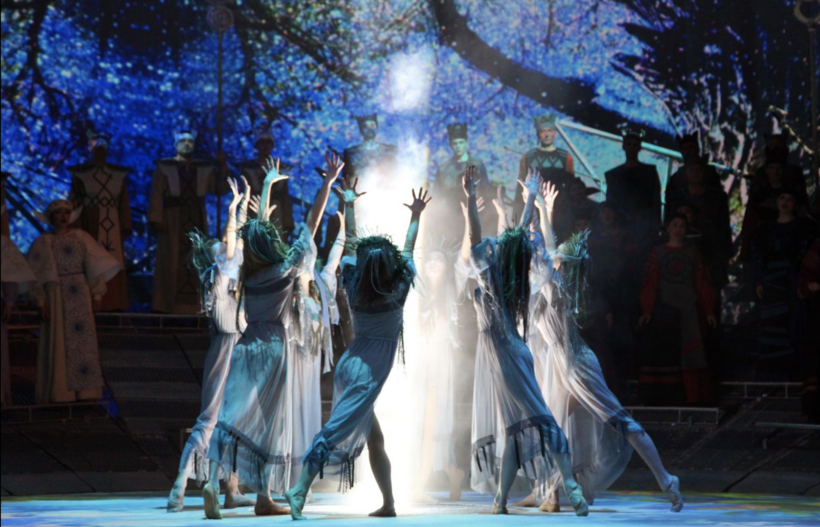We’re an hour into a psychedelic explosion of Midsummer pagan courtship rites—a seasonally adjusted Rite of Spring, as it were—when a lone tenor takes center stage to sound a quiet new chord of heroic defiance. “Poor Ukraine is crying,” the subtitles tell us. “Hordes trampled with horses small children. Young people are taken prisoner. Ukraine is occupied. Masters and khans are ruling there. High time, brother, to stop idling! Take a long, sharp saber and go to war. You are fighting with sabers, and I with my fists. Glory of Cossacks will last forever.” If we in the West think of Cossacks as hard-charging marauders from Russia, Ukrainian patriots proudly claim that name for themselves.
The multimedia pageant at hand—part ballet, part oratorio, with elaborate projections—is When the Fern Blooms, music by Yevhen Stankovych, text by Oleksandr Stelmashenko after the great Nikolai Gogol, a fellow Ukrainian. In August 2020, a live video of the work showed up on the pan-European Web portal Opera Vision without fanfare. Then Putin launched his “special military operation,” and in a flash, yesterday’s obscure regional curiosity broke out as show of the hour. Like the broadcasts of Volodymyr Zelensky and news footage of freedom fighters decanting Molotov cocktails on their sidewalks, When the Fern Blooms expresses the indomitable Ukrainian spirit for all the world to see.

According to the sketchy available sources, When the Fern Blooms was written at the behest of the otherwise untraceable French concert producer Alitepa for a World’s Fair in Paris in 1978 (but there was no World’s Fair that year, and the last of the seven that did take place in Paris was in 1937). Moving right along, we read that the Soviets banned the work ahead of its out-of-town premiere in Kyiv in 1978, destroying the costumes and décor for good measure. Apart from occasional excerpts, the score languished until its concert premiere in 2011, also in Kyiv. The first full staging followed in 2017 in Lviv, a separatist stronghold of 700,000 some 50 miles from the Polish border and a UNESCO World Heritage site. There, two years later, cameras captured a live performance.
Only a week ago, Lviv was bracing for the worst. In the historic center, dozens of statues were being wrapped and padded against attack, while the Web site of the Lviv National Opera announced that the company’s work was “temporarily suspended.” Yesterday, the first bombs struck an aircraft-repair plant only four miles from downtown. The opera house may well go the way of the theater in Mariupol, not to speak of the likely human toll.
Even if that happens, the song will go on, and let’s not mistake it for a requiem. “The question for us now is to be or not to be,” Zelensky told the British Parliament on Zoom on March 8. “This is the Shakespearean question. For 13 days, this question could have been asked. But now I can give you a definitive answer. It’s definitely yes, to be.” In its own soul-stirring key, When the Fern Blooms is singing Zelensky’s song.
When the Fern Blooms is available to stream on the Opera Vision Web site
Matthew Gurewitsch writes about opera and classical music for AIR MAIL. He lives in Hawaii

